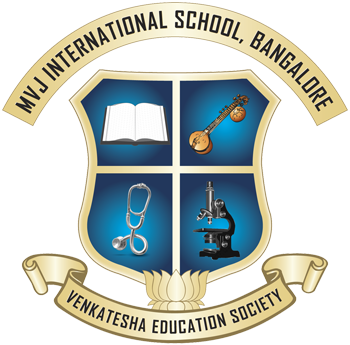


Co- Scholastic activities are defined as the activities that enable students to supplement and complement the Co-curricular or main syllabi activities. These are very important part and parcel of educational institutions to develop the students' personality as well as to strengthen the classroom learning. Co-curricular activities are meant to bring social skills, intellectual skills, moral values, personality progress and character appeal in students and at MVJIS we follow every bit of it. It includes athletics, cultural events, Library activities, science lab activities, classroom activities, creative arts and meditation and so on.
MVJIS aims at physical, emotional and mental well-being of the students. Even during the lockdown period, Yoga at home was aimed to engage children meaningfully through fun and education elements about yoga. Yoga brings together physical and mental disciplines to achieve a peaceful body and mind. Yoga teaches us that having a healthy mind is one of the key elements for our healthy survival. Each one of us need to practice yoga accompanied by meditation on order to be physically and mentally fit.
Art and craft ideas and activities also reinforces math concepts like reasoning, analytical skills, problem solving skills, addition, subtraction, measurement, and spatial awareness. They not only develop these skills in young students in a playful way but also tickle the curiosity of the young minds. Art and craft activities give kids a sense of achievement and allow them to take pride in their work which builds confidence. At MVJIS, we believe that making art is a great, safe way to discover that it's okay to make mistakes and that getting things 'wrong' can lead you to a whole new idea.
Music creates social cohesion, it speaks to all when words can fail, and wherever you go in the world, it is understood. Music is a universal gift and its power to connect people is without question. It is an art form with human interaction at its centre. Music is often functional because it is something that can promote human well-being by facilitating human contact, human meaning, and human imagination of possibilities, tying it to our social instincts. Cognitive systems also underlie musical performance and sensibilities.
Dance develops physical, creative, imaginative, emotional and intellectual capacities and it also requires social skills. Dance provides opportunities for artistic and aesthetic education as well as opportunities for children to explore and express moods and ideas symbolically through movement. Dance allows people to be more active, socialize and develop creative and physical skills. Just a few of the benefits increased exercise dancing can give you are : reduced stress levels, improved relaxation, stronger bones & muscles, weight control and a healthier brain.
Karate practice strengthens the mind, develops composure, a clearer thought process, deeper insight into one's mental capabilities, and more self-confidence. It strengthens the entire body, improves coordination, quickens reflexes, builds stamina, teaches self- defence and looks after the overall health. The purpose of karate is to develop well-balanced mind and body, through training in fighting techniques. It also shares the ultimate aim which is to cultivate great human character of a higher class that prevents any violent attack before an actual fight occurs.